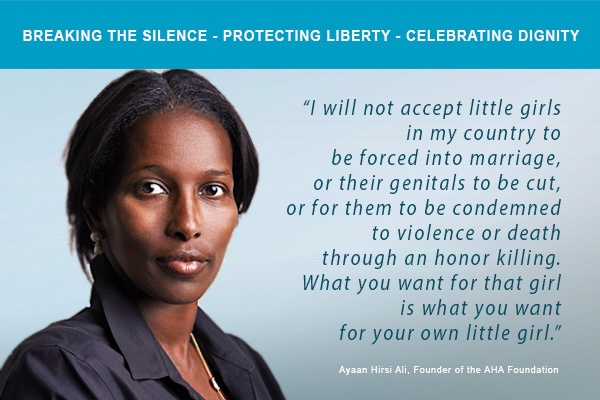September Newsletter: Ayaan Hirsi Ali on 9/11 and how she became a staunch defender of freedom of speech; Our long-time supporter, Ambassador Bremer shares about standing up for women’s rights in Iraq

When tragedy engulfed New York City on this day 19 years ago, it felt like the world stopped as we came face to face with true terror. From our TV screens, we grasped the pain that flooded the streets of New York, and we sought to understand what cannot be easily understood. At that time, I was living in the Netherlands, where I worked as a researcher at a think tank linked to the Dutch Labour Party.
For several years prior to 9/11, I had growing doubts about the compatibility of Islamism and Shariah law with Western civilization, as I had come to embrace the open society of the Netherlands and its far-reaching tolerance for women’s rights and the rights of vulnerable groups of all stripes. 9/11, however, forced me to confront my own religious views in the most direct manner possible. The growing danger of Islamism could no longer be denied or wished away.
When I explored the justifications that were used by the attackers, I was disheartened and ultimately left the religion of my birth. In later years, I began to explore venues for religious reform, but at the time, I felt compelled to speak out publicly to warn the broader public of the clash of values between Islamism and the open, free society.
My speaking out in the Netherlands would result in threats, fierce retaliation, and sometimes acts of violence. When public silence is imposed on controversial subjects, it is typically the most vulnerable groups and the most marginalized individuals who suffer the most from this silence. That is why I am such a staunch defender of freedom of speech. Without it, we cannot make progress on the key human rights issues confronting us.
Today, there is another dangerous ideology afoot in the U.S. and the Western world. This movement goes by many different names—cancel culture or identity politics. It aims to restrict our speech and intends to make many controversial subjects effectively “off-limits.” I see the warning signs of this ideology and am again speaking out in favor of free speech. In our blog this month, I spoke with our Executive Director, George Zarubin, as to why that right must be protected, now more than ever.
Another person who saw a significant change in his life post-9/11 was long-time AHA Foundation supporter Ambassador Paul Bremer. He was appointed by President George W. Bush to lead the Coalition Provisional Authority in Iraq in 2003. In this role, he helped establish a provisional government in the country and gave an increased role to women in the Iraqi governing process. Bremer spoke about his work in our interview here.
9/11 is a day that will always be remembered in our hearts, for the courage of the first responders, and for all those whose lives were lost or permanently altered as a result of the events of that day. Our thoughts are with the nearly 3,000 people who lost their lives on 9/11, the numerous wounded, and the thousands more whose lives were changed forever 19 years ago today.
Thank you for your continued support,

Ayaan Hirsi Ali, Founder

